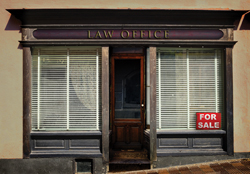Can a Lawyer Who Sells Practice Start Again
Legal Ethics
Ideals opinion: It's OK to 'practice' after selling a police do to assist in the transition

Shutterstock.com
For many decades, ethics rules in the United States prohibited lawyers from selling any part of their law practices other than concrete assets such as furniture, office equipment and books. That prohibition encompassed the intangible value of the lawyer's "goodwill" —substantially, his or her clients. As a result, those clients were oft left to fend for themselves when their lawyer retired, died, became a judge or otherwise left practise.
Things changed starting in 1990, when the ABA Firm of Delegates approved a revision to the Model Rules of Professional Deport.
Under the new Dominion ane.17, a lawyer or law firm may sell or purchase a law practice, or an area of constabulary practice, including goodwill, subject to certain specific conditions: The seller must cease practicing in the area of practice being sold in the jurisdiction or geographic area in which the lawyer had conducted the practice; the entire exercise, or area of do, is sold; the seller gives appropriate notice to clients afflicted by the auction; and fees charged to clients may non increment considering of the auction.
Since then, Rule 1.17 has been adopted in some version by country jurisdictions throughout the state. The Model Rules are the basis for binding professional person conduct rules in every country, although California follows a different format. Simply fifty-fifty after some 25 years on the books, Rule one.17 still raised some unanswered questions. In October, however, the Standing Committee on Ideals and Professional Responsibleness issued Formal Opinion 468 to resolve ane of those issues.
Despite the requirement that a seller stop taking cases in the area of practice being sold, the committee states in its opinion, "a question has arisen equally to whether a selling lawyer or law business firm may nonetheless go on to 'exercise' to assist the heir-apparent or buyers in the orderly transition of active client matters."
The answer, the committee ended, is aye. "The requirement of Rule 1.17(a) that the seller of a constabulary practise or area of exercise must cease to appoint in the individual practice of law, or in the surface area of exercise that has been sold, does non forestall the seller from profitable the buyer or buyers in the orderly transition of active client matters for a reasonable menstruum of fourth dimension after the closing of the sale," the opinion states. "However, neither the selling lawyer or law firm nor the purchasing lawyer or constabulary firm may pecker clients for time spent only on the transition of matters."
THE Right Corporeality OF TIME
The committee linked its finding to the underlying purpose of Model Rule 1.17. The master purpose of the rule was to eliminate disparities in how clients of police force firms and sole practitioners were affected by the departure from practice of a lawyer responsible for a client matter. Prior to adoption of Rule 1.17, a law business firm could assign a customer to another chaser at the firm. But "clients of sole practitioners were left to fend for themselves after their lawyer left the practice because the lawyer had no legal way to sell the do," states the opinion. Model Dominion 1.17 also allowed sole practitioners to transfer clients to a purchasing lawyer or business firm through the "goodwill provision."
Just Rule 1.17 did non accost the timing of when a seller "ceases to engage" in the individual practice of law for purposes of helping the purchasing lawyer and clients through the transition to new ownership of the practice.
In its stance, the ethics commission states that, under the rule, "the selling lawyer may no longer have new matters in the relevant practice or area of practice, and that prohibition should logically accept consequence immediately upon the closing of the sale. Still, given the history and purpose of the rule, as well as the blackness-letter provisions and comments to the dominion, it seems reasonable to conclude that the transition of awaiting or agile client matters from a selling lawyer or business firm to a purchasing lawyer or business firm need not be immediate or abrupt."
Just how long any transition should take in any detail customer representation "will necessarily depend on the circumstances," the opinion states. "It is therefore impractical to propose any prescriptive time limitation for when the selling lawyer 'ceases to appoint' in the private exercise of police force in the relevant exercise area or jurisdiction post-obit the sale of a constabulary practice or area of law practice."
Just regardless of how long the transition takes, the opinion emphasizes that "clients should not experience any adverse economic bear on from the sale of a practise or area of practice."
This commodity originally appeared in the March 2015 issue of the ABA Journal with this headline: "Fix Sale: ABA ethics opinion holds that a lawyer selling a practice may take time to assist in the orderly transition of client matters to the purchaser."
Give usa feedback, share a story tip or update, or report an error.
maughanpurabbighty.blogspot.com
Source: https://www.abajournal.com/magazine/article/ethics_opinion_its_ok_to_practice_after_selling_a_law_practice_to_assist